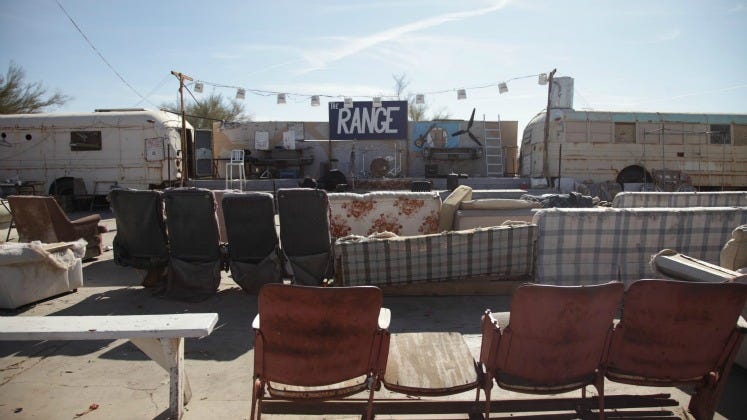Open Mic Night After the Apocalypse

For Indy Film Fest showtimes, click here.
“Open Mic Night After the Apocalypse” is a concert film about a concert that didn’t happen or, rather, one big show that got split up into a bunch of little gigs.
Writer/director Mike James, a Hoosier who grew up on a small Indiana farm, came up with the idea for a concert in the desert featuring some of his favorite Los Angeles bands. Along with chums/producers Paul Prado and Todd McLaughlin, they set the thing up on a shoestring, juggling maxed-out credit cards and getting people to do sound, setup, transportation, etc. on spec.
While they were at it, they decided to make a movie about it. So this documentary is itself part of the tale as it unspools. So is it a film about staging a concert, or are they doing the concert just so they can make a documentary? In the end, it doesn’t really matter.
The cinematography is terrific, a combination of handheld and static hi-def video cameras. James and his crew have given this film a thoroughly polished, professional look. The sound design and editing are also first-rate.
The first half of the doc is more interesting than the second, which turns into a pretty standard succession of bands doing their thing. Some of them have a genuinely engaging sound, like Judson McKinney, but other groups are fairly generic-sounding examples of their respective genres, which range between Americana and punk.
Other featured bands include Manhattan Murder Mystery and Seasons. James calls them “different branches of the same family tree.”
The meat of the story is in trying to make the concert happen in Slab City, a California oasis near the Mojave that couldn’t even properly be called a town. It’s more a camp centered around the dilapidated remains of an old Army base, where the careworn residents come to live anonymously, inexpensively, off the grid or a combination of all three.
Various obstacles crop up and are dealt with, from canceled parking to insurance woes. But the biggest blow falls when they show up and the local police won’t let them perform on the one stage big enough to handle them all. At first literally crushed into despondency that their dreams and hard work have been dashed, James and his partners come up with an elegant solution — which also happens to pass legal muster.
James starts and ends his picture with a rumination on his beloved sister, killed by a cop in a car accident in 1997. She taught him to dream and never quit, and both of those admirable qualities are clearly on display in his bid for a concert.
But I wish he had woven the story of his sister more centrally into the story of his concert. As it is, it acts as an awkward framing device that doesn’t mesh with the rest of the movie. For instance, I’d love to know if his sibling’s death at the hands of a law enforcement officer colored his interaction with police in Slab City.
It’s one discordant note in a worthy effort by a promising Hoosier filmmaker.
3.5 Yaps



